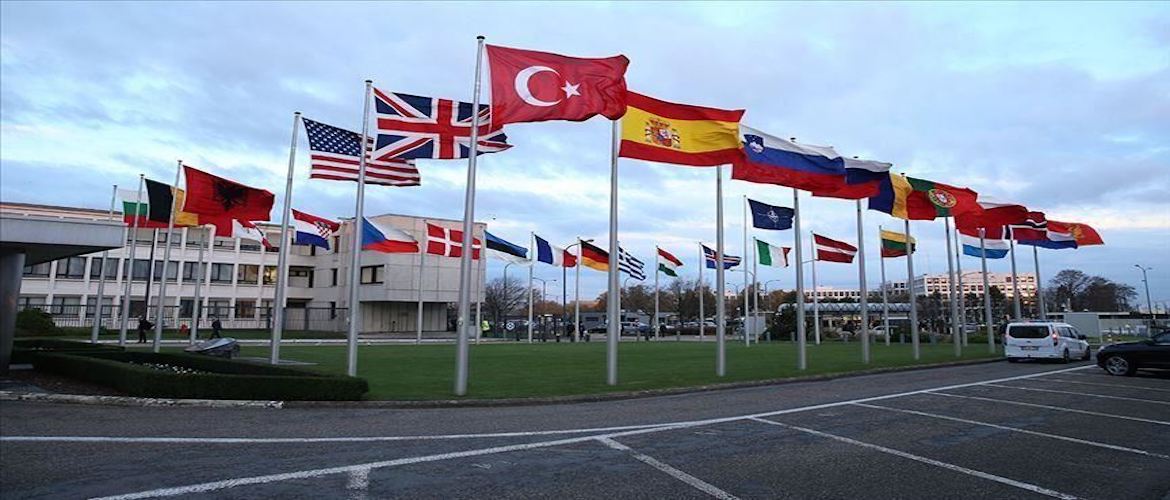NATO - On the Decline
November 12, 2019 | Expert Insights

Background
Crafted together under American tutelage in 1949, NATO formed the bulwark for western democracies against the threat of the ‘Red Storm’. However, soon after the disintegration of USSR, many questioned its continued existence, but then US had other purposes for it and so it continued. It came together, sporadically and intermittently, as and when Western interests were in peril, always led by its mentor, the US. It played a major supporting role in the global war against terror and was pressed into service in Syria when the Caliphate started beheading westerners.
French President Emmanuel Macron, in an interview to the Economist, has succinctly described NATO as, ‘brain-dead’; emphasizing, what he perceives as the waning commitment of the US, under President Donald Trump, to the trans-Atlantic alliance. Europe stands on “the edge of a precipice”, he says, and needs to start thinking of itself strategically as a geopolitical power; otherwise, we will “no longer be in control of our destiny.”
Analysis
Post the collapse of USSR, NATO continued on the pretext of providing collective security to its members. It has also been involved in dealing with the global crisis and fostering partnerships to meet emerging challenges, under US leadership.
But cracks had started appearing in the alliance. While previous US administrations were rather circumspect with NATO members for not doing enough for collective security, President Trump has been more forthcoming. He has publicly pointed out that NATO members were not meeting their defence spending guideline of 2% of their respective GDPs and that their troop contributions in Iraq and Afghanistan, had belied US expectations. This resulted in the US doing most of the heavy lifting in any of the NATO-led commitments. Of more importance, Trump raised concerns about US commitment on Article 5, the defence guarantee that an attack on even one NATO member, would be considered an attack on the US. This leaves a doubt in minds of its NATO allies whether US will be there to bail them out if things really got out of hand in their own backyard.
On its part, NATO has been battered by its own sets of problems. The BREXIT controversy is causing deep fissures within the countries and if UK succeeds, there may be others to follow. Russia under Putin is on the rise, showing increasing aggression and its virtual annexation of Crimea and inroads into Ukraine has shown the ineffectiveness of NATO as a military alliance. Turkey, although a member, is uncontrollable, and is closer in many ways to Russia than its NATO allies. China, the rising power, is catching up on US and while individually, NATO members have close trade ties with China, collectively NATO is confused about how to react to China’s rise.
The most serious strain on NATO has been caused by the Turkish invasion of North-East Syria. The unilateral US withdrawal from the region, and abandonment of NATO-backed SDF, to the advantage of another NATO member Turkey, threw the alliance into diplomatic disarray.
The Turkish offensive, against the SDF (Syrian Democratic Front), has reportedly claimed more than 90 victims and displaced 1,30,000 mainly Kurdish refugees. Both the US and Russia have mediated a temporary truce with Turkey and SDF fighters are withdrawing South from the Turkish border. NATO, which was an important player in the region, has now been marginalised in a single stroke, with its rivals calling the shots.
In yet another impulsive move, President Trump has approved a new US military mission, to secure oil fields in Syria, which are under Kurdish control. However, details about the new mission are scanty.
Assessment
- Many NATO members, who were backing the SDF with military power and funds, credit this plucky organisation with the near-total destruction of the ISIS as a military entity. They were strongly advocating the realisation of the Kurd dream of a homeland carved out of Northern Syria, and US was to take the lead to make it a reality. Now the general feeling amongst NATO allies is that the Kurds have been abandoned for narrow political reasons.
- More likely, Trump’s announcement of the new mission to safeguard the oil fields which provide Kurds their sustenance is a damage control exercise. Reportedly, even within the US administration, security hawks and military brass are unhappy with the President’s unilateral withdrawal from Syria.
- The geopolitical balance too is rapidly shifting in this sensitive region, to the determent of western allies. In recent months, it has definitely swung in favour of Russia/Syria alliance, Turkey and Iran. President Macron, therefore, has very valid reasons to question the relevance of NATO, particularly if the alliance was not consulted, prior to President Trump’s withdrawal announcement.
- The relevance of NATO peaked, during the Cold War Years. However, in today’s context, that threat has certainly receded. Most European countries recognize the diminished threat and have reduced defence spending; not even meeting the minimum guideline expected of NATO members. From the perspective of NATO’s European members, it is both economical and smart, to acquire the US security umbrella, at such little cost. But given Trump's views, this may change soon.
- In the future, recognising the diminishing role of US, it is prudent for the EU, to accept greater responsibility for their own security. Also, US military power should expectedly be increasingly focused towards China and the East Pacific seaboard. Therefore, there is merit in President Macron’s provocative description that NATO is ‘brain-dead’. This is also an opportunity for Europe to restructure its collective security, making its’ capacities more relevant to the current times; to include counter-terrorism, cyber-security and protection of space.
Read more
- NATO and Turkey: An Imminent Divorce?
- NATO vs SCO: A New Multipolar Order
- Russia, NATO seek strategic advantage
Image Courtesy: Anadolu Agency








Comments